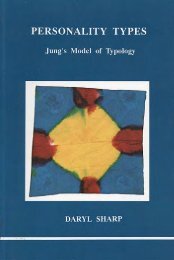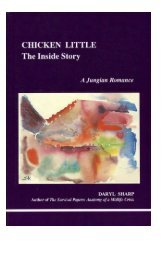Digesting Jung: Food for the Journey - Inner City Books
Digesting Jung: Food for the Journey - Inner City Books
Digesting Jung: Food for the Journey - Inner City Books
You also want an ePaper? Increase the reach of your titles
YUMPU automatically turns print PDFs into web optimized ePapers that Google loves.
38 The Value of Conflict<br />
Perhaps <strong>the</strong> most painful conflicts are those involving duty or a<br />
choice between security and freedom. Such conflicts generate a<br />
great deal of inner tension. As long as <strong>the</strong>y are not conscious, <strong>the</strong><br />
tension manifests as physical symptoms, particularly in <strong>the</strong> stomach,<br />
<strong>the</strong> back and <strong>the</strong> neck. Conscious conflict, on <strong>the</strong> o<strong>the</strong>r hand, is<br />
experienced as moral or ethical tension.<br />
I have worked analytically with married men and women who<br />
had secret lovers and troubling physical ailments. By and large,<br />
<strong>the</strong>y did not come to me because of a conflict over <strong>the</strong>ir extramarital<br />
activities, which were safely compartmentalized. In truth, <strong>the</strong>y<br />
were split and didn’t know it. But when <strong>the</strong>ir right hand (ego)<br />
openly acknowledged what <strong>the</strong>ir left hand (shadow) was doing,<br />
<strong>the</strong>ir physical symptoms disappeared. There <strong>the</strong>n followed moral<br />
tension and a conscious search <strong>for</strong> resolution.<br />
Conflict is a hallmark of neurosis, but conflict is not invariably<br />
neurotic. Life naturally involves <strong>the</strong> collision between conflicting<br />
obligations and incompatible desires. Some degree of conflict is<br />
even desirable, since without it <strong>the</strong> flow of life is sluggish. Conflict<br />
only becomes neurotic when it settles in and interferes, physically<br />
or mentally, with <strong>the</strong> way one functions.<br />
Two preliminary possibilities exist <strong>for</strong> resolving a conflict. You<br />
can tally up <strong>the</strong> pro’s and con’s on each side and reach a logically<br />
satisfying decision, or you can opt <strong>for</strong> what you “really want,” <strong>the</strong>n<br />
proceed to do what is necessary to make it possible.<br />
Many minor conflicts can be decided by reason. But serious conflicts<br />
do not so easily disappear; in fact <strong>the</strong>y often arise precisely<br />
because of a one-sided rational attitude, and thus are more likely to<br />
be prolonged than solved by reason alone.<br />
Where this is so, it is appropriate to ask, “But what do I want?”<br />
or alternatively, “What do I want?” These are useful questions, <strong>for</strong><br />
<strong>the</strong> first, with <strong>the</strong> accent on “I,” clarifies <strong>the</strong> individual ego position<br />
(as opposed to what o<strong>the</strong>rs might want), and <strong>the</strong> second, stressing<br />
“want,” activates <strong>the</strong> feeling function (judgment, evaluation).<br />
A serious conflict invariably involves a disparity between think-










